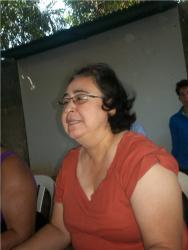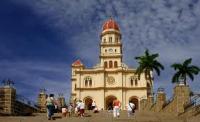 Nicaraguan President Daniel Ortega and the Sandinista government have failed the country's women. That was the message delivered by Azahalea Solís, an attorney and a member of Nicaragua's Autonomous Women's Movement, speaking at the Ben Lindner Center in Managua on January 17 to an audience of Nicaraguans and American students from various universities.
Nicaraguan President Daniel Ortega and the Sandinista government have failed the country's women. That was the message delivered by Azahalea Solís, an attorney and a member of Nicaragua's Autonomous Women's Movement, speaking at the Ben Lindner Center in Managua on January 17 to an audience of Nicaraguans and American students from various universities.
The Sandinista Government has Failed the Women of Nicaragua: Solis
The Church and the Critical Left in Cuba
 The influence of the Catholic Church in Cuba is growing, a recent and unanticipated development. Why? Has there been a big religious revival that has filled the Church pews? Not really. So, if there has not been a major increase in Catholic religiosity, why has the Catholic Church become important? For entirely political reasons.
The influence of the Catholic Church in Cuba is growing, a recent and unanticipated development. Why? Has there been a big religious revival that has filled the Church pews? Not really. So, if there has not been a major increase in Catholic religiosity, why has the Catholic Church become important? For entirely political reasons.
Mexican Congress Approves Education "Reform"
The Mexican Congress has in near record time approved a new law on education called for by the new president Enrique Peña Nieto intended to reassert government control over the country's education system, break the power of the Mexican Teachers Union bureaucracy, and improve the quality of education. At the heart of the new law is a regular teacher evaluation with increased emphasis on merit.
Repression in Mexico – an urgent appeal
Students are fighting for their dreams and are being met by violent repression. Chilean youth have mounted the largest demonstrations since Pinochet’s murderous regime took power. Yet, they continue their struggles for jobs and educational opportunity. The latest chapter in this story is being written in Mexico. Protestors have been “disappeared.” We know what that likely means if international protests are not mounted.
Mexico's Opposition Parties Sign "Pact for Mexico," Left in Disarray, Radical Youth in Violent Rebellion
Enrique Peña Nieto of the Institutional Revolutionary Party (PRI), Mexico's new president who took office on December 1, carried out a shrewd political maneuver the very next day, convincing the opposition parties to join him in signing a "Pact for Mexico," calling for the completion of the neoliberal transformation begun in the 1980s.
MORENA Established As a New Party on the Mexican Left
The Movement of National Regeneration (MORENA), which served as the campaign organization of Andrés Manuel López Obrador for president of Mexico in the election held this past summer, has transformed itself into a new political party on the Mexican left. López Obrador has now brought into existence a new party that will compete with the Party of the Democratic Revolution that put him forward for president in 2006 and 2012.
Mexico: When the Center Will Not Hold
Review of Jo Tuckman. Mexico: Democracy Interrupted. (New Haven: Yale University Press, 2012). 311 pages. Photos. Bibliographic Essay. Index. $35.00 hardback, $19.25 Kindle.
Communism Confronts the Mexican Revolution
Daniela Spenser. Stumbling Its Way Through Mexico: The Early Years of the Communist International. Tuscaloosa: University of Alabama Press, 2011. Translated by Peter Gellert. 205 pages. Notes. Index.
Latin American Marxist: José Carlos Mariátegui
While most English speakers don’t know him, the Peruvian José Carlos Mariátegui ranks as one of the great Marxists of the twentieth century. It was Mariátegui who originally asked the question which seems so relevant today: How does one make socialism in Latin America with Indians? He answered by turning the question around in the other direction: Indians in Latin America will be at the center of the fight for socialism in Latin America.
Is Cuba Different?
Since the 1930s, most of the international left has defined their "socialism" not as the uncompromising defense of working class self-organization and self-activity, but as the uncritical support of one or another regime that claimed to be "socialist." Whether they idealized the Soviet Union, China, Cuba, Albania, or North Korea, most socialists have placed the defense of their particular "socialist fatherland" above the needs of working people at home and abroad.
Seventy Years of Bolivian Radicalism
This remarkable piece of militant history, based on interviews, as well as leaflets, letters, manifestos, dug out of public archives and private collections, from the heights of La Paz to the outskirts of Paris, deals with the Bolivian labor movement, the most persistent and combative in the Western Hemisphere. Bolivia is one of the very poorest countries of the Americas, and also the most Indian: 2/3 of the population describes itself as indigenous.
Infectious Disease
"According to information supplied by members of the military high command in 1994, President Salinas already had given orders for a massive military move into Chiapas to root out and destroy the insurgents, but was dissuaded by the United States Embassy and some of his own governmental advisors because Subcomandante Marcos had become a charismatic figure worldwide and Mexico could not afford the negative publicity that crushing the movement would create.
Mexican Movement Fights “Imposition” of PRI’s Enrique Pena Nieto
The Mexican presidential election that took place on July 2 is over—but it is not done. Tens of thousands of Mexicans have been marching every week for almost a month in Mexico City and other cities throughout the country against what they call the “imposition” by Mexican election authorities of Enrique Peña Nieto of the Institutional Revolutionary Party (PRI) as president of Mexico.
Statement on Mexican Election from Group in Veracruz
[Introduction by Dan La Botz: As tens of thousands throughout the country protest the results of Mexico’s presidential elections, a group in the State of Veracruz has issued a statement calling upon Mexicans to both refuse to recognize the results of the election and to engage in a campaign of civil disobedience to make it impossible for the new government to rule.
Tens of Thousands of Students March in Mexico Against Growing Fraud Scandal and the Imposition of PRI’s Peña Nieto
Carrying signs denouncing fraud, tens of thousands of students and other voters marched through Mexico City on July 7 to protest what they see as the government’s imposition on the country of presidential candidate Enrique Peña Nieto of the Institutional Revolutionary Party (PRI). Peña Nieto received 38 percent of the vote, compared to 32 percent for Andrés Manuel López Obrador of the left-of-center Party of the Democratic Revolution (PRD), and 25 percent for Josefina Vázquez Mota of the conservative National Action Party (PAN).
Mexicans Vote to Return the PRI to Power: Updated
[This report updates the report written and posted on the New Politics blog on July 3.]
Cuba, Socialism and Democracy
In January 2011, members of the Participatory and Democratic Socialism Movement proposed that the Cuban Communist Party adopt its "Proposals for the Advance of Socialism in Cuba." ("Socialism and the 'Citizens' Demand for Another Cuba," Pedro Campos, Havana Times, June 24, 2012)* These socialist critics of the Cuban regime offered a program of radical democratic proposals including full freedom of speech and press, freedom of association (including partie
Mexicans Vote to Return the PRI to Power
Enrique Peña Nieto of the Institutional Revolutionary Party (PRI) has won the Mexican presidential elections with a plurality of 37 percent of the vote, returning to power the party which ruled Mexico as an authoritarian one-party-state for decades. Peña Nieto defeated the left-of-center Andrés Manuel López Obrador of the Party of the Democratic Revolution (PRD) who got 31 percent of the vote and Josefina Vázquez Mota of the conservative National Action Party (PAN) who received about 26 percent.
On the Eve of the Elections: The Impact of the New Student Movement
As Mexicans prepare to vote on Sunday, July 1 in the national elections, two presidential candidates have pulled ahead and each claims that he will win. Enrique Peña Nieto, candidate of the Institutional Revolutionary Party (PRI) that ruled Mexico for over seventy years, is ahead in all of the polls, buoyed up by the PRI’s political machine and the corporate media.
Populist candidate Lopez Obrador moves up in polls in Mexico as his Keynesian impulses give way to appeals to business
Mexico’s voters face an increasingly murky choice in the rapidly approaching July 1 national election between three conservative, pro-business candidates and a populist candidate who until recently offered Keynesian solutions to the country’s endemic problems of inadequate economic growth, huge economic and social disparities, and a political establishment dominated by and in the service of a handful of oligopolies.
